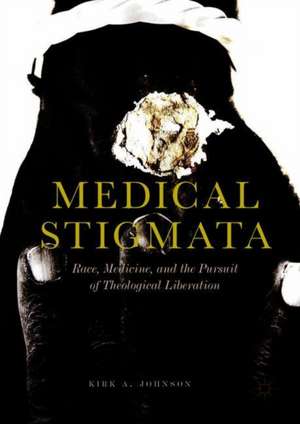Medical Stigmata: Race, Medicine, and the Pursuit of Theological Liberation
Autor Kirk A. Johnsonen Limba Engleză Hardback – 29 oct 2018
| Toate formatele și edițiile | Preț | Express |
|---|---|---|
| Paperback (1) | 347.04 lei 6-8 săpt. | |
| Springer Nature Singapore – 28 dec 2018 | 347.04 lei 6-8 săpt. | |
| Hardback (1) | 497.96 lei 6-8 săpt. | |
| Springer Nature Singapore – 29 oct 2018 | 497.96 lei 6-8 săpt. |
Preț: 497.96 lei
Preț vechi: 585.84 lei
-15% Nou
Puncte Express: 747
Preț estimativ în valută:
95.30€ • 98.74$ • 79.53£
95.30€ • 98.74$ • 79.53£
Carte tipărită la comandă
Livrare economică 22 martie-05 aprilie
Preluare comenzi: 021 569.72.76
Specificații
ISBN-13: 9789811329913
ISBN-10: 9811329915
Pagini: 170
Ilustrații: IX, 178 p.
Dimensiuni: 148 x 210 mm
Greutate: 0.38 kg
Ediția:1st ed. 2019
Editura: Springer Nature Singapore
Colecția Palgrave Macmillan
Locul publicării:Singapore, Singapore
ISBN-10: 9811329915
Pagini: 170
Ilustrații: IX, 178 p.
Dimensiuni: 148 x 210 mm
Greutate: 0.38 kg
Ediția:1st ed. 2019
Editura: Springer Nature Singapore
Colecția Palgrave Macmillan
Locul publicării:Singapore, Singapore
Cuprins
Chapter 1 Introduction.- Chapter 2 Race-Based Medicine.- Chapter 3 Maleficence toward the Minority Patient.- Chapter 4 Research, Race, and Profit.- Chapter 5 Black Theology and Reconciliation.- Chapter 6 Conclusion.- Bibliography.
Recenzii
“Medical Stigmata encourages readers to apply similar hermeneutics to clinical contexts, using scripture to challenge the determinist narratives that pervade medicine and its adjacent industries.” (Audrey Farley, Marginalia, marginalia.lareviewofbooks.org, October 18, 2019)
Notă biografică
Dr. Kirk A. Johnson teaches at Seton Hall University and Berkeley College in New Jersey, US. He is a member of the American Society of Bioethics and Humanities and The New York Academy of Medicine. He serves as a member of the Atlantic Health Systems Bioethics Committee and was formerly Assistant Director of the Medical Humanities program at Drew University in Madison, New Jersey, US.
Textul de pe ultima copertă
This book observes the idea of race as a false representation for the cause of disease. Race-based medicine, an emerging field in pharmacology, aims to create a specialty market based on racial groups. Within this market, the drug BiDil set a precedent in this area of medicine targeting African Americans as its first racial group. Consequently, selecting African Americans as a “starter group” led to ethical questions regarding the motive behind race-based medicine within the context of the larger treatment of blacks in American medical history. This book therefore links medicine and American eugenics, examines race-based medicine’s influence on the perception of the black body, traces the influence of BiDil’s approval on the resurgence of race-based medicine, and assesses the black church’s response to race-based medicine using black liberation theology as a means to social justice.
Caracteristici
An effective synthesis of existing work while breaking new ground in the African American religious and secular response to race-based medicine
Connects recent medical research to older ideas about racial superiority and inferiority, the black body, and race-based experimentation
Unites scholarship on the historical, philosophical, theological, and scientific lens through which the black body has been viewed by the larger public and scientific community
Connects recent medical research to older ideas about racial superiority and inferiority, the black body, and race-based experimentation
Unites scholarship on the historical, philosophical, theological, and scientific lens through which the black body has been viewed by the larger public and scientific community
